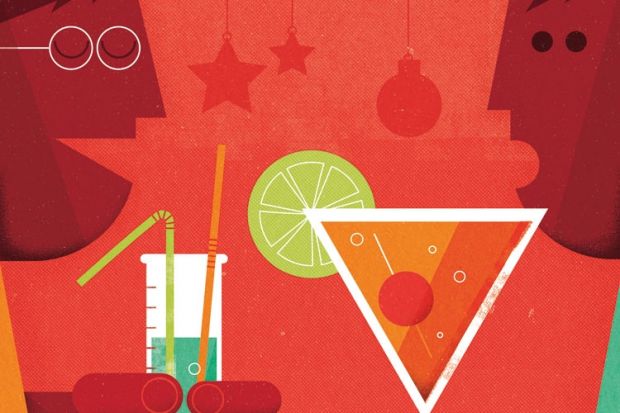Source: Dale Edwin Murray
The season is once again upon us when we scientists are asked to leave the safe embrace of our laboratories and enter the complex social matrix of unfamiliar relations, friends of friends and obligatory conversations with complete strangers.
This can be problematic on so many different levels, but the cocktail party represents a special challenge. Most of us participate but fail to engage fully and leave with the uneasy feeling that multiple opportunities have been lost. The root of the problem, of course, is the inevitable question: “So what do you do?”
Until recently my response was to answer with specificity, providing a potted version of my curriculum vitae and then, in an attempt to be topical, finish with a detailed description of my latest paper. For several years I even carried a copy of that document in my jacket pocket, where it waited expectantly, like a trapdoor spider, to emerge and bite into the consciousness of my nameless victim.
I am not the most socially attuned of individuals. Indeed, my deep insensitivity has been much admired by colleagues, but even I could detect the surreptitious glances of my questioner looking for an escape, followed by the inevitable “excuse me while I just go and top up my drink” or “I’m ravenous: I must find the grub”. They never returned, and I felt somehow diminished. Clearly a different stratagem was required.
My first thought was to ask a colleague what he said at cocktail parties. Missing the point entirely, his response was immediate: “I’ll have another.” Then, warming to the theme, he added that climate change scientists say “where’s the ice?”; seismologists ask for their drinks to be “shaken and not stirred”; microbiologists request “just a small one”; and social scientists prefer “something soft”.
So I was left to rack my brains for the answer to my dilemma. It finally dawned on me that answering the “what do you do?” question with specificity was not the appropriate tactic. Instead, I developed a more general, historical – and much more successful – spiel, which I would urge fellow scientists to try.
“Well,” I say, “as a scientist my occupation grapples with the fundamental nature of truth. It is worth reflecting that before the emergence of a robust scientific class in the 19th century, truth was defined by the whim of the ruling class. Indeed, we scientists wrested truth away from the claws of religious dogma and liberated humanity from the leaden hand of ignorance and, in the process, provided the evidenced-based infrastructure required for a truly democratic society – namely individual liberty and equality of opportunity. I suppose I’m just part of that meritocratic force that has defined our civilisation.”
At this point I pause for both gas exchange and dramatic effect. But don’t lose momentum. Bite aggressively into something of substance: a Scotch egg or a sausage roll works well, although a mini cream eclair can create quite the wrong impression. Then continue: “Why was it, do you think, that during the 19th century the poorer sectors of society embraced science so avidly? From the 1860s working people would pay a significant portion of their daily wage just to listen to professional scientists like Thomas Henry Huxley speak. His famous ‘lectures to working men’ were always full to capacity. People were there not only to hear the latest scientific findings about the origins of our species, but also to witness first-hand the liberating affirmation that truth is the product of experimentation and is forged upon evidence. The words ‘how’ and ‘why’ took on a new and sharper significance 150 years ago, cutting the knots of meek acceptance that bound the individual to the state, allowing humanity to stride unfettered into the modern world…
“So that’s what I do – how about you?”
I cannot pretend that this response has worked in every social situation. There was the one occasion, over mulled wine in the crypt, when I apparently soured the atmosphere after midnight Mass. But at least I felt better knowing that I had shared an appreciation of the scientific method. Christmas is a time for giving, and what more precious gift could a scientist give?
So cocktail parties no longer fill me with unease. I enjoy them – not just because I feel more fulfilled but also because of the warm glow of benefaction that comes from having helped other scientists to endure this social hurdle by adopting my conversational tactic. Just last week my waggish colleague ended the evening with his enraptured listener by saying: “Please give me a ring.” That is a notable triumph for a shy benzene biochemist.
Register to continue
Why register?
- Registration is free and only takes a moment
- Once registered, you can read 3 articles a month
- Sign up for our newsletter
Subscribe
Or subscribe for unlimited access to:
- Unlimited access to news, views, insights & reviews
- Digital editions
- Digital access to THE’s university and college rankings analysis
Already registered or a current subscriber? Login





